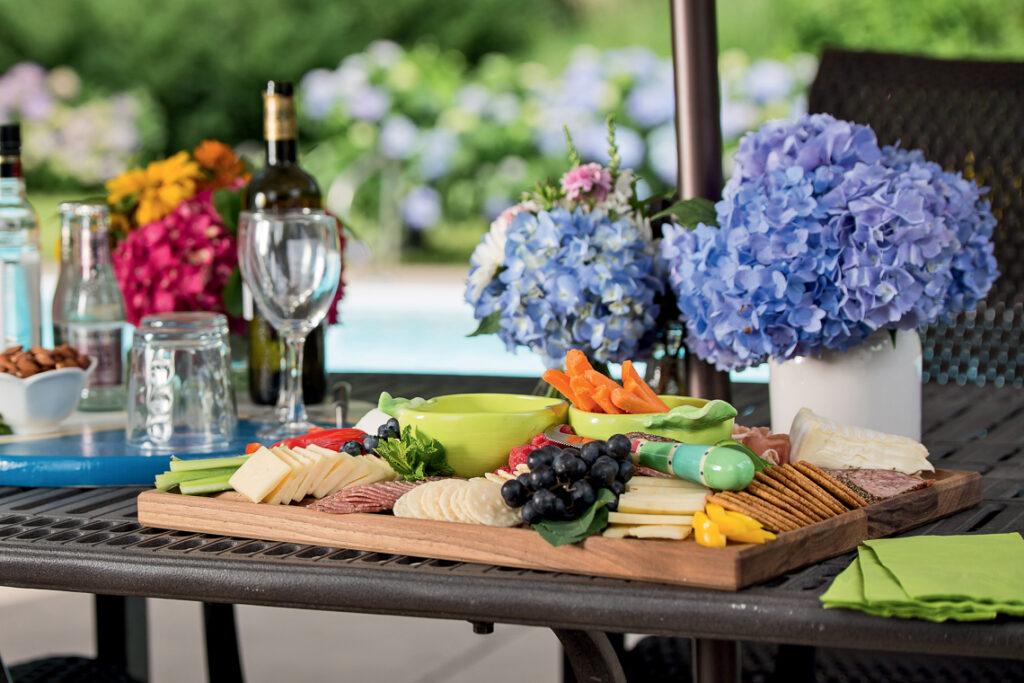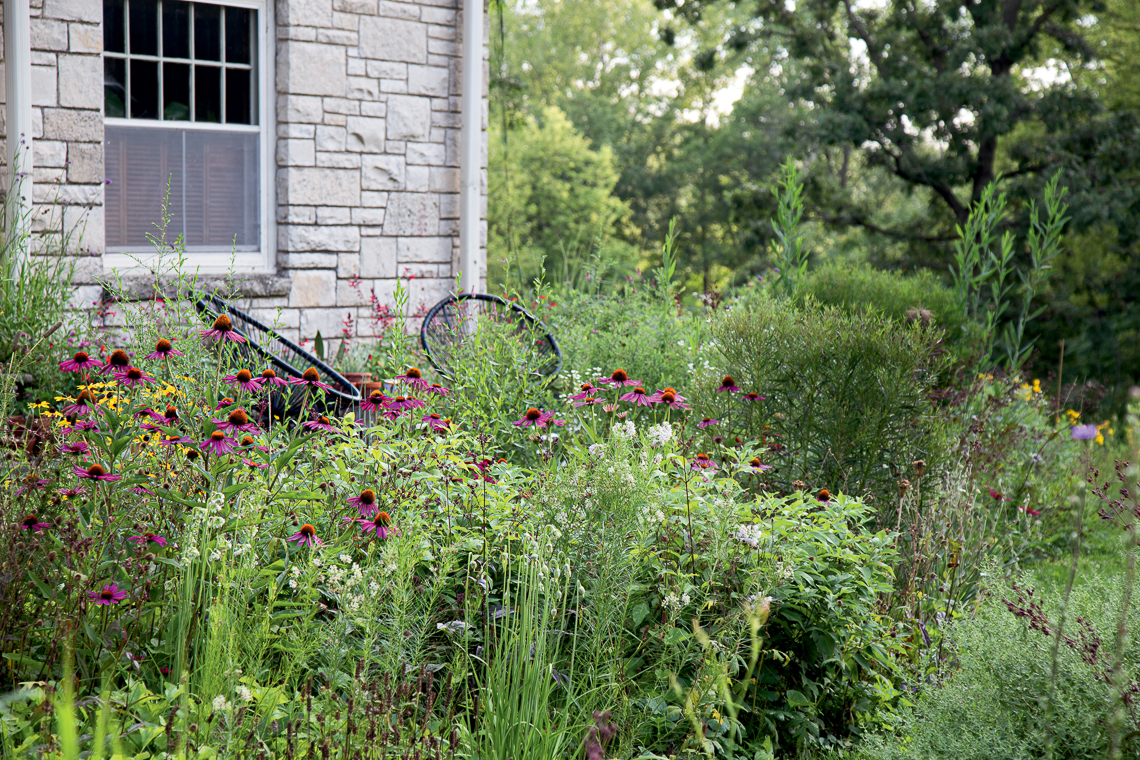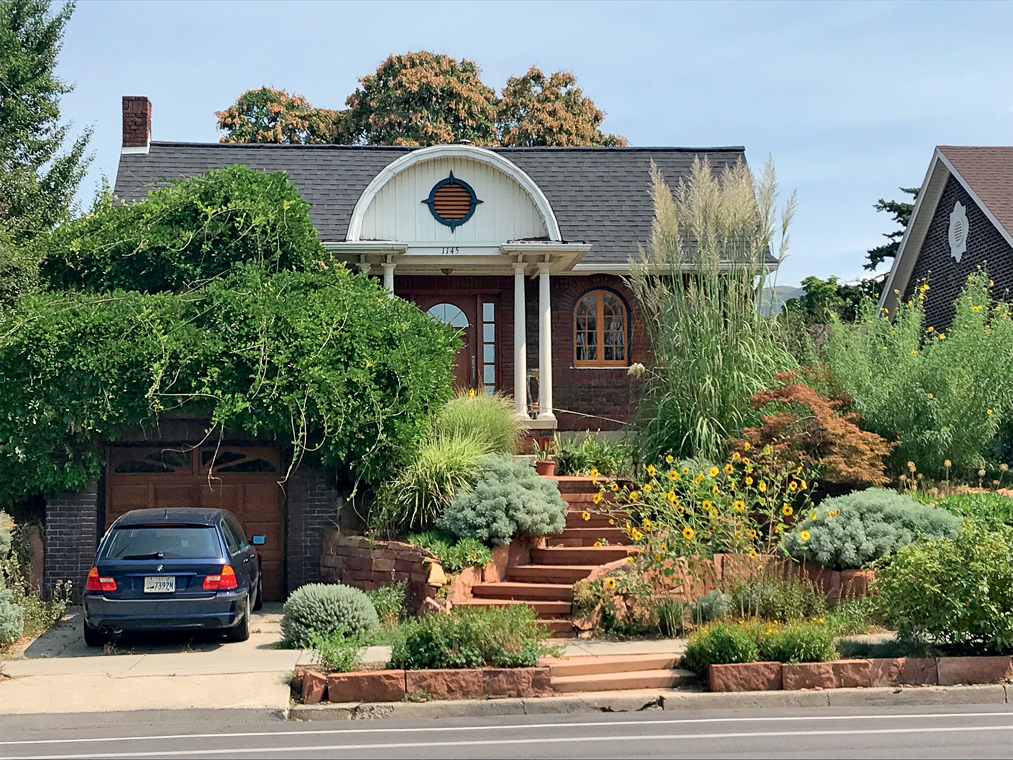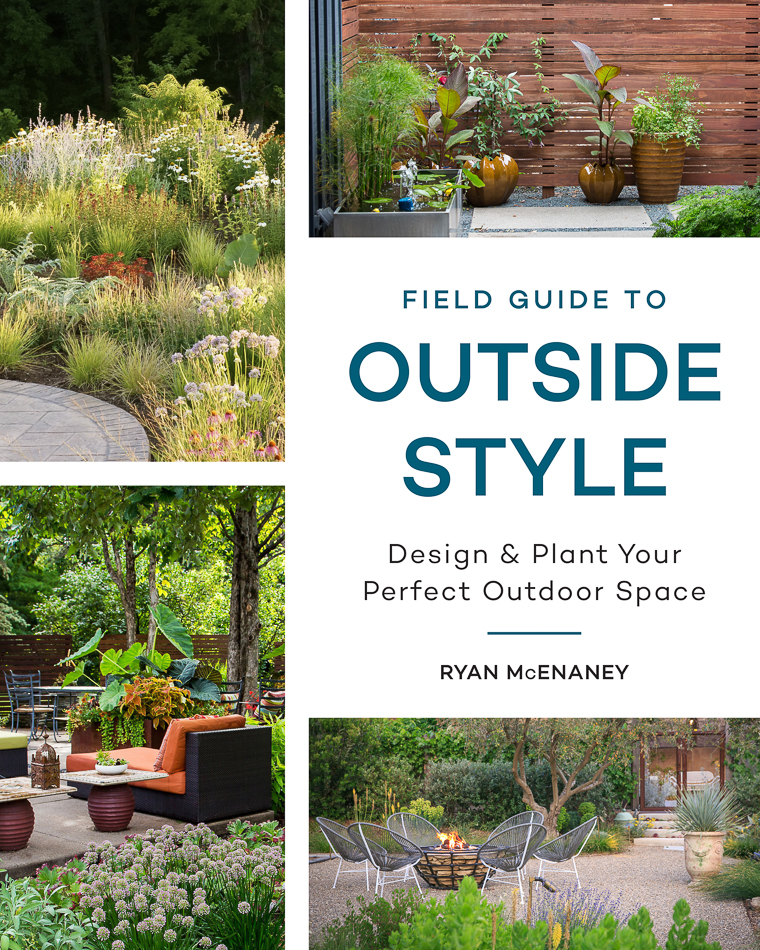Outside Style: Book Review & Giveaway

I'm not even waiting until this one is available for sale before I tell you about it – I'm that excited! But let me start at the beginning…
I met the author, Ryan McEnaney several years ago over a glass of wine – sauvignon blanc to be specific. We were at a conference for garden writers and started chatting over our mutual excitement about all things garden-related. We've been good friends and colleagues ever since (cemented by the fact that he secretly paid for my wine!) Little did I know that a few years later he would write this book.
As I read the introduction and first few chapters I laughed out loud as he was recommending cocktails to accompany the assignments – and I could truly hear his voice as I read each page. He's a fun loving guy and that really comes through. So, the first thing I want you to know is that this isn't a heavy-duty design book full of trade-speak. It's written by a young, fun, and totally great guy who is sharing his insights and solid 'how to' info.
What makes this book different?
My bookshelves are groaning under the weight of design books written by some of the worlds best designers – but I'm going to make room for this one. Let me explain why.
As a designer I spend a lot of time interviewing my clients on the phone and then in person to help them think through what their priorities are, how they need their garden to function, what they are drawn to, what they dislike. It takes time and some detective work but is one of the most important parts of the design process. Few clients are able to describe succinctly the style they are drawn to or the "feel" they want to elicit when sitting in their garden simply because they've never had to analyze it before. I use a mix of leading questions, visuals (I have all my clients create a Houzz ideabook and then explain to me what they do or don't like about the images they have selected), I look at the homes architecture, I look at the interior decorating style and color scheme and may ask to see a room that the homeowners truly reflects 'them'. All of this to then design a beautiful outdoor room that will be an extension of their home and work for their lifestyle.

Including plants that are native to your region can have many benefits, but what IS a native plant? Ryan explains this in simple terms to help you make an informed decision when it's time to go shopping. Photo credit: Kelly Norris
But what would happen if they didn't call a designer? That's where this book comes in – and is worth its weight in gold because it helps you, the homeowner, self-interview and get a better understanding of how to blend your style and your life outdoors. And since Ryan would never call himself a "designer" (although trust me, he has the creative and artistic qualities to be a design rock star), he speaks the same language as YOU. He's got an easy-going style that makes you feel as though he's sitting right there beside you.
This book helps the homeowner understand not just their needs but also their tastes while realistically circling back to discuss the less than sexy things like maintenance, long-term goals, and budget. He does all this with humor – yet his fun assignments and rhetoric are spot on and essential to a successful outcome. Don't skip these chapters!
Recognizing that we all have different tastes, Ryan writes his design chapter using three distinct personalities as his imaginary clients: Martha (the classic – yet never boring), Tommy (the minimalist who is all about structure) and Kelly (the plant-driven designer and naturalist). Frankly it's brilliant.
He then covers all the basics of design from color and texture to seasonality and more, using sketches to illustrate how each of these clients might interpret his ideas in a design that evolves over time (as most DIY projects do). This is another standout difference from my other design books – the case studies and illustrations can help you visualize results and fine-tune your plans.
The final fun piece are the recipe cards where he suggests plant combinations and specifies climate zones and conditions these combinations will work for.
Who will enjoy the book?

Understanding your "why" takes time, but Ryan walks you through the process. For this homeowner is was all about overcoming the challenging steep entry. The gently sweeping path is not only functional it takes you on a journey through the garden. Photo credit: JLY Gardens
Well anyone who knows Ryan….but certainly young gardeners who aren't even sure that they should call themselves a gardener yet as they are still learning. Anyone faced with a blank slate or needing to renovate an existing garden that plans on doing much of the work- or at least the plant selection themselves. Frankly, anyone I haven't got time to assist – because Ryan takes all that I do – and makes it available to YOU.
Where can I buy the book?

Ryan is a fifth-generation nurseryman based in the tundra otherwise known as Minneapolis. He loves his husband, his dog and good wine – usually in that order, but preferably all together.
It is available now for pre-order online (great Xmas present idea!) and come early December will be available at all your favorite bookstores.
Enter to Win a Signed Copy:
the drawing is now closed and the winner notified
Ryan is going to mail a signed copy to one lucky reader! Just leave a comment below telling me which part of designing a garden you find the most challenging. Is it choosing the right plants? Visualizing how it might look in 10 years? Understanding scale – how big to make your patio for example? Or something else entirely?
Giveaway rules
- Only comments left on this blog post will be entered into the drawing – not on any images within the blog post or on social media.
- Only one entry per person please.
- Only residents of the USA will be entered to win the book (due to shipping costs) but of course comments are welcome from all.
- Drawing will be by random number generator at 10am PST on Tuesday November 8th
- Winner will be notified by email and will have 48 hours to respond with their mailing address after which time another name will be drawn.
Lead photo credit: Tracy Walsh
Disclaimer: this post contains affiliate links.
Subscribe to Receive Blog Posts
Gardening inspiration delivered right to your inbox from Le Jardinet

I adore gardening books and especially ones that challenge me to narrow down my vision because I love to collect ALL the plants!
I totally understand that! I swear most of us are great at addition but less so at subtraction! Good luck 🙂
I have difficulty visualizing scale in the garden and selecting shrubs/trees that will not outgrow my garden,
You are not alone in that. Although there are a few 'tricks' to help I must confess that a lot is intuitive. I personally find mapping out a design even on simple graph paper is helpful using circles to indicate the 10 year diameter of a tree canopy for example.
Knowing where to begin with a blank slate is difficult for me. This book sounds like it could help my dilemma.
I think this would be a perfect book for you and take away that sense of 'overwhelm' by working through the self-interview then paring things down a bit. Good luck
I struggle with knowing how to deal with my overgrown garden. Not just goldenrod and other good but aggressive natives but the good ideas I had but they didn’t really fit and I need to move them!
Sounds like stepping back and making a master plan might be in order! Good luck with the giveaway.
I love so many different design styles, I find it difficult to come up with a cohesive look in my garden. This book looks like it could really help with that.
I think you're right! I wonder if you'd be Martha, Tommy, Kelly or a blend?!
I love the look of most healthy plants I see in the nurseries and on online sites – and want to integrate them all in my garden. However, I have limited space and have trouble selecting the right plants for the location and that will go with surrounding plants. Thanks for the vivid description of this new design book.
Sometimes the problem is that there are just too many choices! I think this book would help you narrow down that list – good luck
My back garden is long and narrow and very flat. I have trouble getting different heights incorporated to keep it from looking like a bowling alley.
I'd approach that be creating a wide path that meanders front to back, past peninsula beds that are anchored with a taller specimen tree such as a river birch at the end of each peninsula. Then underplant with layers to create a scrim so that the view is partially obscured. That would distract from the long, narrow shape. Fun!
I have trouble limiting my plant choice because I want them all to see how they do in my landscape.
Research, right?! We are so good at justifying our plant shopping sprees!
I want to have it all, especially in my small cutting garden. My challenge is going to be maintaining it all as I age. I could use some help with focus!! Very nice review of the book, Karen.
Thanks Gale – yes maintenance is key and one that Ryan does address in his book too. Good luck!
My design problem is trying to overcome planting one of all the new plants I want to try. Sometimes the result is pleasing to the eye but other times it's a little too much of a "test garden" look than something cohesive. Hello my name is Ron and I'm a plantaholic. Maybe a down to earth desing book will help me?
Well Ryan is certainly down to earth! I know what you mean about a test garden though. I do have one area specifically for testing but try to be a little more strategic elsewhere.
Does this book offer recipes for Zone 9a in the Gulf south? So many garden magazines and books neglect our zone.
Does it help us adjust our plans for climate change?
The design principles and concepts are relevant for every climate as they are universal. I went back to the book to look up the recipes with your question in mind and there are some in fact listed as "subtropic climate (down to 20'f)", as well as others for cold climates, arid or high elevation climates, and temperate climates, again with temperature ranges given. As far as climate change modifications being given – most of us are still trying to guesstimate how to do that – and it is not the focus of this book.
My challenge usually involves trying to work with a focus on native plants and developing a design that plans for the ever present deer population. My go to resource is your book, and I have found it most informative and helpful.
I'm so glad you have found my book helpful – thank you!
I guess the hardest part for me in designing my garden is deciding how to renovate a mature garden in the house we moved into, what to keep and what to get ride of.
Maybe start with some lists: what brings you joy? What is too much work? What fulfills a certain function?
My challenge is designing a water wise garden. We have homes in the desert and Pacific Northwest, one with catchment water only and the other water being the lifeblood in the summer. I love all things plants and sometimes I want what I shouldn't have!
I hear you!! Good luck in the draw
Challenge #1 drawn to spiky plants…need to think fluffy, large leaves, billowy
Challenge #2 Believe the mature size on the plant tag, and add a few more feet in California
Challenge #3 Sit and relax in my garden, without jumping up every 5 minutes to deadhead, trim, water, move plants etc.
I laughed out loud at #3!! At least you've identified your challenges
Nice review of Ryan’s book, Karen. My design challenge is inheriting a 15 year old garden with mostly Rhodies and Azaleas where I want cutting flowers and perennials. So I need to remove some of those and choose the right plants for a shade to sun garden. Ryan’s book sounds divine.
I think you'd love it – good luck!
I love my garden. I have lots of plants, but alas I am getting older and am getting to the point where I can't manage it anymore, so need to scale down but hate getting rid of things.
Maybe give things to friends and garden clubs and ask for visitation rights? 🙂
#1 Challenge: Digging holes and keeping up with getting plants in the ground before leaves come off and I can't remember what's in the pot if the plant tag falls out. I want them all! And, while I want to have native plants to attract and provide for wildlife – I want the birds to get the berries, but the deer to leave the leaves alone. They are called "leaves" for a reason, right?
Great laugh reading this LOL. Good luck Cat!
After a summer of crane fly larva devastation, we've decided to replace the back lawn with paths and new planting beds (yay! More room for plants!). I'm probably a blend of Martha & Kelly, but now with a hardscaping project on the horizon, I need to add some Tommy to the mix! This book could put me on a path to success 😉
Your new project sounds fun – and yes, you may need this book!
I started with over an acre of blank space and went nuts, added hundreds of species, whatever natives I could put my hands on in the beginning. Now I'm finding it hard to go back and edit, pruning trees and shrubs, eliminating ill-fitting volunteers, moving ill-conceived choices, etc, both physically (I've had both shoulders rebuilt in the past four years) and mentally (the jumble is a little overwhelming). Things got a little out of control this past summer, and I really want to get things back into shape before I break ground on the next area, but I also really want to convert another 25,000 square feet of lawn into native plant meadow/garden.
Your garden plans sound exciting – but also have the potential to be really high maintenance! Be careful you don't create a monster – good luck with the giveaway
There's nothing like having both shoulders reassembled to give you a healthy reminder of your limitations and a forecast of how you might feel about yard work in 20-30 years!
And that is actually something for us all to consider even without injuries. Just because we have time/enthusiasm/energy/ability today doesn't mean we will even next year. I try to set maintenance baseline low and only extend it with things like container gardening that can easily be reducing without impacting the design at large
I was really fortunate to spend time in the company of older people with gorgeous and extensive gardens throughout my life, and I've seen several go through a transition from "I do it all," to "I hire someone to come in a few times a year to take care of the heavy stuff," to "I've scaled back to something lower maintenance," so I'm always thinking ahead!
My home came with existing garden beds on tw0-thirds of an acre that were nicely done, but rather dull. I immediately wanted to expand and rework the existing gardens and carve out new gardens in the existing lawn area with a focus on native and adapted plants for birds and pollinators. I’m satisfied with the overall hardscape layout of the garden beds, but I can’t seem to get the plant selection and plant layout in the respective garden beds to look like anything more than a big jumble of too many different plants. There is just no evidence that plants were selected and planted with a particular plan in mind or any thought as to how they look together, blend together, or offer contrast where needed.
I wish you lived closer Linda! A few broad stroke tips: 1.Think in vignettes, not just in mini-combinations, 2. Repeat one signature color and/or plant throughout the garden, and 3. Be sure you include focal points which are NOT plants here and there 🙂 Good luck with the giveaway
My biggest challenge is the diverse uses of my property with multiple planting areas, and how to bring that together in a single cohesive vision. From a cut flower growing area, an orchard, a native area for the local antelope herd to forage, it's hard to bring the 5+ acres together. This book looks like an excellent resource to help determine my style and possibly herd all my butterflies into one net.
Like you I have 5 acres Rhonda. I've found that because you can't see multiple areas from a single vantage point, it is possible for each area to have its own identity without it feeling in-cohesive providing each area itself is well executed with repetition of a signature color/plant, but certainly learning to understand your own style would be a good first step. For me it is "foliage first" I guess! Good luck with the giveaway
With our most recent home purchase/move, we acquired several acres of mature shrubs and trees. Some of the shrubs were either not thriving or not my style. Over the last 3-4 years we have removed much, but we also try to work with the framework of what is here. My problem is balancing the scale of the new (smaller) plant choices to be intermixed with the mature (overgrown, perhaps) trees and shrubs that remain on the property.
That's a tough one – but where annuals cone in useful even as a short term solution while newer things are growing in. Deer-resistant cleome would work well for you – especially some of the taller varieties while simple white alyssum is fabulous to fill in between existing plants
All of the above! I don’t know enough about scale, color, growth to confidently choose plants. I am overwhelmed at the prospect. But, I do enjoy a beautifully planned garden. I have seen such inspiring landscapes from you.
Well you would love this book! Good luck in the giveaway
So maybe the book can help me figure out how to actually USE my small patio. More inclined to mess around in garden than use the patio. Not inviting.
Invite you friends over – then you HAVE to sit on the patio! Good luck in the drawing